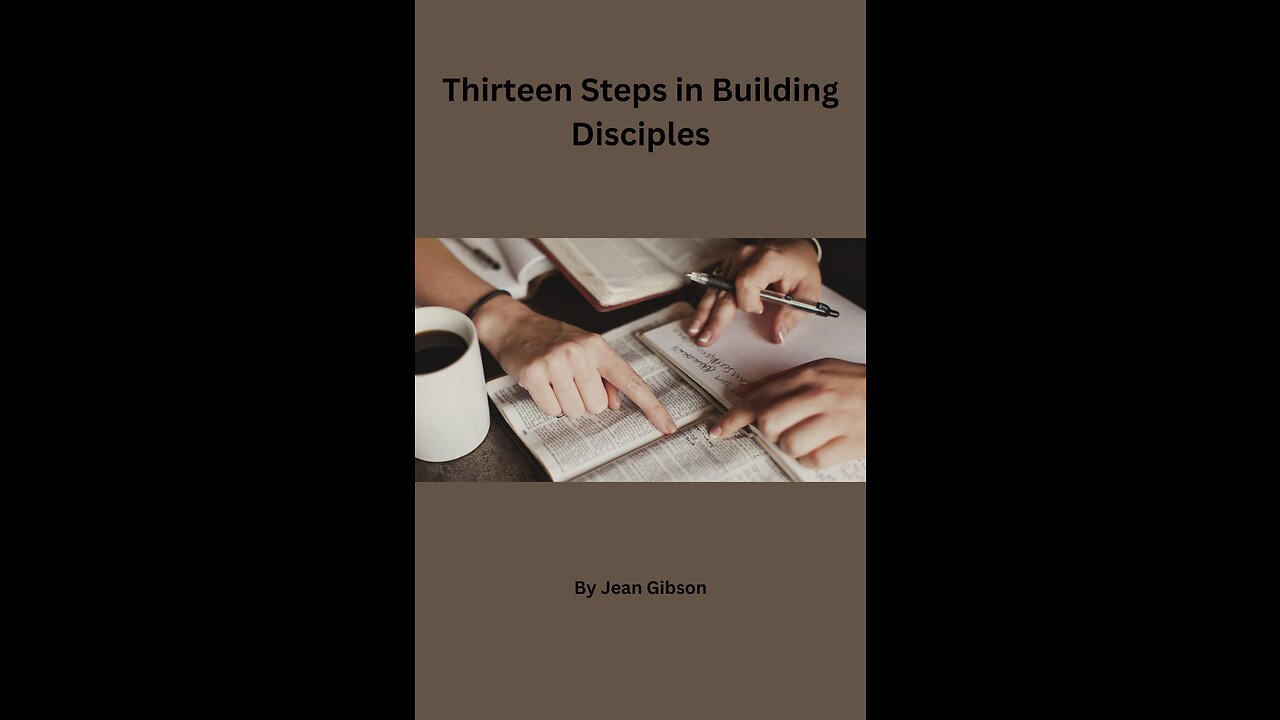Premium Only Content

Thirteen Steps in Building Disciples, Discussion Questions on 13 Steps
The Writings of Jean Gibson.
Thirteen Steps in Building Disciples
If you don't want to read the long Introduction, watch the first video.
Introduction to Thirteen Steps in Building Disciples.
There are a number of stepping stones between a believer's conversion and a mature, fruitful life. We enumerate here 13 steps, with explanatory notes and suggestions on the road to being what Jesus called, a "true disciple."
Believers are called to be disciples. How can this be accomplished? There are 13 things that should be laid before each believer who aspires to be a true disciple. Those who assist them should touch on each point. Here is an outline of each of these points.
1. Follow-up. Initial assistance is given new or untaught believers who never received it following a profession of faith. It is not God's purpose to allow new believers to remain immature "babes in Christ."
2. Disciple-Making is the process of moving a convert from the initial follow-up to being a mature follower of the Lord Jesus.
3. Improving Disciple-Making - Part I. This teaches them to be strong finishers, how to claim God's resources for victorious living, how to make needed life changes, respond to the Lordship of Christ, and the example of the Lord Jesus as the True Disciple Preeminently.
4. Improving Disciple-Making - Part II. This teaches the proper goals for a true disciple, unacceptable characteristics, problem areas at their roots, the necessities of effective discipline meetings, and both dos and don'ts to keep in mind. There is also an evaluation sheet that the disciples should learn to use positively with the person being helped.
5. Improving Disciple-Making - Part III. This will review "time-wasters" and "time-savers" so the disciple can be "redeeming the time because the days are evil" (Eph. 5:6). Suggestions are given to achieve this purpose.
6. Multiplication in Discipleship. This calls for specific steps to help someone become a "spiritual reproducer," one who trains others to do what he or she has been trained to do. Eight steps are given in this process, each essential for a "multiplier" and the candidate.
7. Commitment to Servanthood. This teaches disciples to serve others for Christ's sake, just as He, the Perfect Servant, did in His earthly ministry. It outlines the meaning of both servant (diakonos in Greek) and bond slave (doulos in Greek). It provides examples of faithful and unfaithful servants and shows the benefits to all concerned.
8. Effective Use of Spiritual Gifts. This shows the meaning of a "spiritual gift," as distinguished from human talents, and its God-given purpose for the individual and the local church. It classifies gifts and shows how they are to be utilized.
9. The Disciple's Vision for the Church. This shows the importance of the church as a divine institution, both universal and local. It shows what is needed for effective function and notes hindrances to its development. It is intended as a family-gathering center, a workplace, a help station for the needy, and an outreach center. It is not set up to be simply an auditorium to hear sermons by preachers.
10. Spiritual Goals, Purposes with Eternity's Values on View. All successful endeavors, divine or human, require definitive, long-term goals, as well as short-term, to achieve lasting purposes. They must be pursued with a "single eye," Christ is always the center. There must be a plan, and priorities to achieve in order of importance. Suggestions are given for things we
need to do or stop doing or study more deeply. Hindrances must be recognized.
11. World Vision and God's Eternal Plan. This lesson lays before the disciple that God thinks "worldwide." "He loved the world and gave His only begotten Son" to save people (John 3:16). He is "not willing that any should perish" (II Pet. 3:19), but that all should "come to repentance." This lesson explains the nature of real vision, beyond the immediate scope of time and sense. Suggestions are given for achieving this vision.
12. Worship on a Regular Basis, Remembering that God Seeks Worshippers (John 4:23)! The lesson defines worship (speaking to God, about Himself). It is personal and corporate (with other believers). The Scriptures ring with doxologies (praise to God), for Himself, His wonderful works, and His salvation. Disciples must learn to be better worshippers, frequently, and fervently.
13. Watching for His Coming and Preparing for His evaluation of our lives here on earth when it's all done. We do not know the day or hour (Matt. 25:13). It is imminent and might be at any time. The true disciple yearns for this. It is the last prayer of the Bible (Rev. 22:20). We will then be judged for our lives and service here at the Judgment Seat of Christ (II Cor. 5:10). We will not be judged for our sins for Christ paid our debt (Rom. 8:1).
Appendix A - Deals with the "School of God" for Disciples.
Appendix B - Deals with "Spiritual Warfare" by Disciples.
-
 6:49
6:49
Christian Writings
1 year agoNew Series 22 The Morning Portion By W J Hocking
100 -
 LIVE
LIVE
Wendy Bell Radio
4 hours agoThe Party's Over
10,836 watching -
 5:31
5:31
Adam Does Movies
22 hours ago $0.12 earnedThe Monkey Movie Review - This Is From The Longlegs Director?
11.3K1 -
 14:47
14:47
Tactical Considerations
14 hours ago $3.02 earnedClassic Precision Woox Furiosa Bergara Premier 6.5 CREED
9.88K1 -
 40:44
40:44
Rethinking the Dollar
22 hours agoDonald & Elon Head to Fort Knox—What Are They Planning?
7.67K16 -
 1:10:15
1:10:15
MTNTOUGH Fitness Lab
1 day ago"My Baseball Career Wasn't Enough": Adam LaRoche's Life-Changing Anti-Trafficking M
12.6K2 -
 1:00:12
1:00:12
The Tom Renz Show
19 hours agoComing to America & Coming to Christ
27.4K7 -
 1:12:21
1:12:21
TheRyanMcMillanShow
1 day ago $0.04 earnedDebbie Lee: Mother of First Navy Seal Killed In Iraq, Marc Lee - RMS 019
10K1 -
 38:05
38:05
Uncommon Sense In Current Times
16 hours ago $0.99 earnedIs Israel Being Forced Into a Bad Deal? David Rubin Exposes the Truth | Uncommon Sense
9.49K9 -

FreshandFit
11 hours agoAfter Hours w/ Girls
118K93